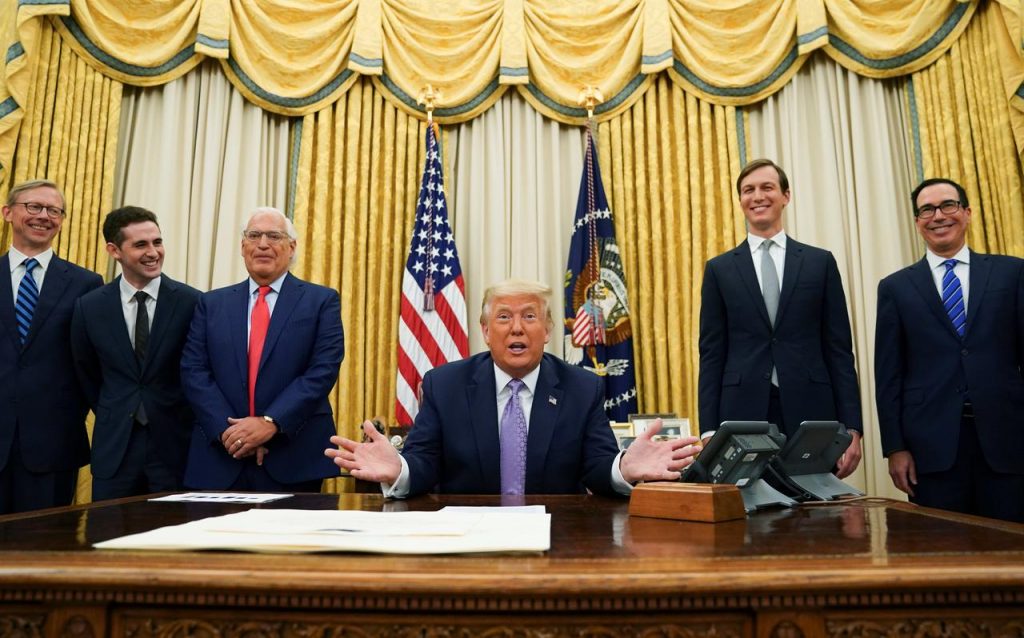
- ARAB NEWS
- 02 Jul 2025

US President Donald Trump’s quest for a second term this November is proving to be difficult but not impossible. The coronavirus disease pandemic has claimed the lives of more than 190,000 Americans so far and it is now the single main factor that threatens his comeback. But, as recent polls show, the gap between him and Democratic candidate Joe Biden is closing as the US enters one of the most bizarre election seasons in history. A defiant Trump is questioning the integrity of mail-in voting, which favors the Democrats, and is warning that the Nov. 3 poll could be rigged.
Pundits are predicting that the final election results could take weeks and maybe months to tally and that a cumbersome legal battle lies ahead. If he loses, Trump will contest the outcome amid a deeply polarized America. Either way, the US faces some tough months ahead.
But what would a second term for Trump mean for the Middle East? A flamboyant Trump has secured a couple of important foreign policy victories ahead of the election. Last week, Bahrain followed the UAE in announcing it would normalize ties with Israel, and these historic agreements will boost Trump’s image as a peacemaker in a region beset by conflicts and turmoil.
Other Arab countries could take similar steps before Nov. 3 and, if Trump wins a second term, one could expect to see a new normal in the region, where Israel emerges as the backbone of a new regional alliance. Trump will continue to decrease America’s physical presence in the region, while backing a proxy Israeli-Arab alliance that is aimed at confronting the threats posed by Iran and Turkey. Gulf countries, in particular, see both of these rivals as aiming to expand their influence in the Arab region and as posing an existential threat. This is Trump’s new security doctrine for the region. Among its chief consequences is the disengagement by Israel’s new allies from what used to be the central Arab cause: The Palestinian question.
Trump’s vision for peace between Israel and the Palestinians will remain as one of many initiatives to settle this decades-old conflict. A second term for Trump is less likely to push for such a settlement. Trump’s peace team will instead focus its efforts on cementing the new Israeli-Arab alliance. Its gestures toward the Palestinians, if any, will be disingenuous.
Trump will push for further US troop withdrawals from Iraq, Afghanistan and, at some point, Syria. His anti-Iran strategy will remain intact in line with the newly formed Israeli-Arab alliance. A second term for Trump would be catastrophic for cash-strapped Iran. The containment of Tehran will add pressure on the regime, but will also push it further toward Russia and China. The collapse of the regime will not be imminent and hard-liners are likely to expand their control of the state at the expense of the so-called moderates. Iranian meddling in Iraqi and Syrian affairs will continue. For Iraq, further US troop withdrawals will make Prime Minister Mustafa Al-Kadhimi’s mission in confronting rogue militias even harder. Trump’s priority will be to bring the troops home at any expense.
A second term for Trump would be catastrophic for cash-strapped Iran. The containment of Tehran will add pressure on the regime.
Osama Al-Sharif
Regional polarization will deepen as the US relies further on regional proxies. Trump has no clear strategy in dealing with Turkish President Recep Tayyip Erdogan, who is emerging as a destabilizing factor in the region. Whether it is in Iraq, Syria, Libya, Qatar or the Eastern Mediterranean, Ankara has become a key player with an ambitious colonial agenda. Its alliance with Russia, in defiance of NATO, of which it is a member, has gone unchecked by Washington. A second term for Trump is unlikely to change his attitude toward Erdogan’s regional adventures.
The biggest regional challenge during Trump’s second term will be the question of who will fill the vacuum left by the US departure. Russia’s intervention in Syria in 2015 has become a milestone in Moscow’s rising regional influence, which has now stretched to include Libya, Turkey, Iran and even Iraq. One is more likely to see active Russian diplomatic, economic and military activity in the region under a second Trump term. America’s departure from the Middle East will also give China the chance to extend its economic influence and build new partnerships.
A Trump victory would underline new geopolitical realities, with the Israeli-Arab alliance taking center stage. It will be interesting to see how long this alliance can endure and how it will be tested. The US will nurture it, but it will coincide with a deliberate withdrawal from a region that Trump sees as becoming less important strategically for America. It remains to be seen what this US disengagement will lead to in terms of the formation of new alliances and the evolution of local conflicts in countries like Iraq, Syria, Yemen and Libya.
Osama Al-Sharif is a journalist and political commentator based in Amman. Twitter: @plato010